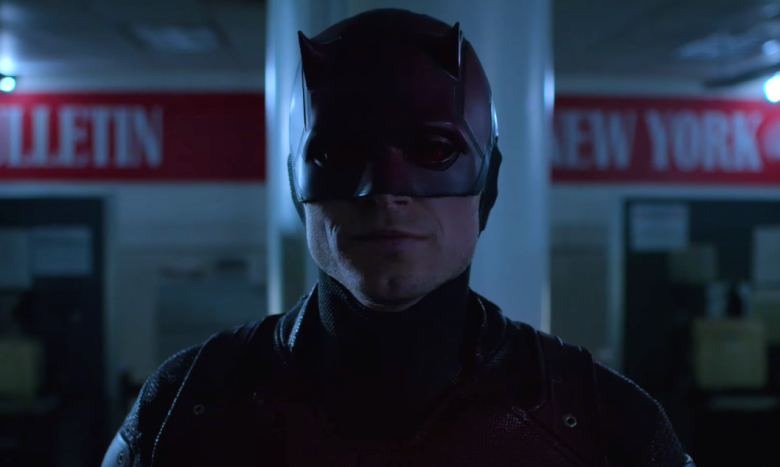Summary
Daredevil’s third season is the most maudlin these shows have been, but solid antagonists and supporting characters (and some great action) give the devil his due.
Marvel and Netflix’s Daredevil has always revelled in Matt Murdock’s (Charlie Cox) vigilantism being a metaphor for Irish-Catholic self-penance. But the first six episodes of Daredevil Season 3 take the concept to its most extreme. Beaten, battered, and still blind, Matt shakes his bloodied knuckles at the sky. How much more suffering must he endure? And how long, I wonder, is he going to brood and complain about it?
This would have been too much if it wasn’t for Sister Maggie (Joanne Whalley), a new character who has known Matt since his childhood and tasks herself with overseeing his mental and physical recuperation. Her acerbic retorts and biting observations are just what he needs at his lowest, since being crushed by a building at the end of The Defenders has resulted in his enhanced senses failing him just as his sight once did. The love of his life is gone, as is his ability to atone for his perceived sins, and to prevent others from committing their own.
Another new character in Daredevil Season 3 is Ray Nadeem (Jay Ali), a talented Fed who, thanks to financial strife, can’t progress up the Bureau. In his desperation he makes a deal to turn the incarcerated Wilson Fisk (Vincent D’Onofrio) into an informant, which, rather predictably, doesn’t go entirely well for anyone. But it does reposition Kingpin as Daredevil’s primary antagonist once again, and a large part of this season’s moral fabric is Matt grappling with the idea that someone as inherently evil as Fisk is being granted privileges by the institutions whose job is to protect the innocent from people just like him.
This is a strong theme and fitting for Daredevil’s current tone and headspace; he isn’t just rebuilding himself physically, but also emotionally, having become disillusioned with not only street-level superheroics but even the idea of his crusade having a divine component. Now he’s just bitter and angry, which is a mode that Charlie Cox works well in, and D’Onofrio’s exaggerated, still brilliant take on Fisk is as good here as it ever was in the debut season.

But Daredevil Season 3 also puts Fisk to great use in carefully manipulating Benjamin “Dex” Pointdexter (Wilson Bethel), another Fed, this one eerily skilled, who is nonetheless troubled, mistrustful and vulnerable to manipulation. Having been repeatedly abandoned and let down throughout his life he’s a perfect foil for Fisk, and will become the perfect foil for Daredevil, though I won’t spoil why. (It’ll be highly obvious to anyone in the know, but I’m playing it safe.)
None of this would matter if Daredevil Season 3 didn’t maintain the show’s usual high standard of construction and choreography, and even after the vastly-improved second season of Iron Fist, there’s something about the fisticuffs here that is immeasurably more satisfying that K’un-Lun kung-fu. Charlie Cox brings an inimitable physical performance to action sequences that elevates them beyond any of their contemporaries in the Marvel/Netflix stable, and I can finally say that the Oldboy-inspired one-take fight from the first season has been bettered.
The first half of Daredevil Season 3 is undeniably slow, and so angsty that it’ll inevitably put some people off. But it’s in service of the title character really being forced to confront his ideals in compelling ways, and the parallels between Matt and his new rival give the show an intriguing duality. Old characters such as Foggy Nelson (Elden Henson) and Karen Page (Deborah Ann Woll) have less to do, but they’re there and offer an additional emotional contour to Matt’s “death”, while foregrounding Kingpin once again is, inevitably, a smart decision. Far from the third go-around feeling like one too many, it puts the pieces in place not just for a return to form, but perhaps for setting the bar as high as it has ever been.




